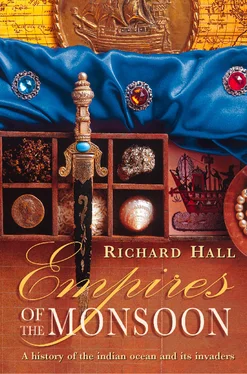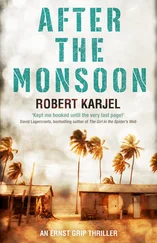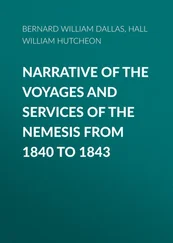When the emir in Sohar hears about the caliph’s order, he has the Jew arrested, but lets him know that a substantial bribe can win his freedom. The emir then takes another step to keep his rich prisoner out of the caliph’s clutches, and to guard his own position. He spreads the news of what has happened and warns all the other merchants in town that if Ishaq is carried off to Baghdad, none of them will in future be safe from similar treatment. The merchants respond as he has expected, first shutting down the market, then signing petitions, then rioting in the streets. They warn that they will all leave, and tell other merchants to keep away from the coasts of Arabia, where a man’s property is no longer safe.
The emir writes a letter to the caliph, recounting what the merchants have said: ‘We shall be deprived of our living, when ships no longer come here, because Sohar is a town where men get everything from the sea. If small men among us are treated like this, it will be worse for the great. A sultan is like a fire, devouring everything it touches. Since we cannot resist such power, it is better to leave now.’ To drive their message home, the merchants line up their ships at the quayside and prepare them for sailing. Affairs grow so out of hand that the eunuch Fulful and his men decide to flee back to Baghdad. As a parting gesture they seize 2,000 gold dinars belonging to the imprisoned Jew.
After they have gone, Ishaq is freed, but is so possessed by rage that he decides to leave Arabia for ever and settle permanently in China. A ship fitted out, all his possessions are loaded into it, and he sails away. But he never reaches China. When his ship nears Sumatra, on the far side of the Indian Ocean, the ruler of a port there demands a huge sum in transit dues, before allowing him to sail on. When Ishaq refuses to pay, men come at night and murder him. The ruler takes the ship and everything in it.
Without offering any judgements, Buzurg allows the reader to deduce a lot from this story, which he clearly intended to be more than fiction, since historical figures occur in the narrative. Above all, it expounds the unwritten law by which trade was conducted throughout the Indian Ocean: whatever their race or faith, merchants should have the freedom of the seas and be given fair and equal treatment in every port of call. As a shipmaster, Buzurg understood exactly how the merchants shunned places where this rule might be broken. It was later claimed for the port of Hormuz, at the mouth of the Gulf, that it welcomed merchants from all the regions of the world: ‘They bring to Hormuz everything most rare and valuable. There are many people of all religions in this city, and nobody is allowed to insult their religions. That is why this city is called the citadel of security.’
Readers of The Wonders of India would also have discerned a far more personal message in this story. The caliph and his Omani emir were Arabs, but Buzurg and his immediate audience were Persians. Although the Persians had been forcibly Islamicized for more than two centuries (Buzurg wrote in Arabic and prefaced his book with all the correct Muslim sentiments), there were many of his compatriots who looked back nostalgically to the glories of their vanquished empire and even clung to its ancient Zoroastrian religion. 7They recalled how their Sassanid cities had been razed, how the Arab conquerors, once the despised nomads of the desert, had set up victory platforms on mounds of Persian dead. The last Sassanid monarch had even sent emissaries to the Chinese to plead for military help, but all in vain.
However, there was no route back to that proud past. While Islam was destined to come under pressure on its western flank from militant Christianity, throughout the Indian Ocean its influence still grew – within India itself, and beyond to Indonesia. Already Islam had taken control of the eastern shores of Africa, to which it looked to meet a perpetual need for human labour.
TWO
Lure of the African Shore
I am being led in Damascus without honour,
as though I am a slave from Zenj.
—from a poem by the historian Abu Makhuaf (d. 774)
EAST AFRICA had been called Azania by the Greeks, but was now known as the Land of Zanj: the Land of the Negroes. The word Zanj (or Zenj ) was originally Persian, but had been adopted by other languages. Once simply used to denote colour, the epithet was later applied in particular to Africans or black slaves – almost always one and the same thing if they were unfortunate enough to find themselves on foreign soil.
The prosperous island of Zanzibar took its name from the word Zanj , and was the usual destination of Arab and Persian captains sailing to Africa on the winter monsoon. 1This voyage meant going beyond the equator, to latitudes where the guiding stars of the northern hemisphere were no longer visible, yet some captains ventured even further south. They went to the very limits of the monsoon, past the mouth of a great river which, it was said, joined up with the Nile in the centre of Africa. Several days sailing beyond the river they reached Sofala, the last big port on the Zanj coast. 2
One lure of this remote region was gold, mined somewhere inland by Africans and brought down to Sofala to be bartered for cloth and beads. The gold was taken back to Arabia, where the risks of the long journey to Sofala were well rewarded, because a constant supply of the metal was needed for the minting of dinars, the currency used throughout the Islamic world. (Temples of the conquered religions had long since been stripped of their gold, and so had all the ancient tombs which could be uncovered.)
The Land of Zanj was not for the faint-hearted. Apart from lurid stories of cannibalism, of African warriors whose greatest delight lay in collecting the testicles of unsuspecting travellers, and the tales of tribes who lived on a mixture of milk and blood – drinking blood was most strictly forbidden by the Qu’rān – it was also rumoured that anyone who went to live in Zanj might find all the skin peeling from his body.
Yet what made Zanj distinct from other centres of trade around the Indian Ocean was its principal role as an exporter of pagan ( kafir ) slaves. Merchants travelled to India to buy embroidered muslins and jewellery, to China for silks and ornate dishes. But anyone sailing to the Land of Zanj would always expect to buy some young and healthy blacks. These slaves earned good prices in the lands along the northern shores of the Indian Ocean: a male labourer purchased with a few lengths of cloth could be sold for thirty gold dinars. If transported as far as the Mediterranean these human chattels brought even more handsome profits; a white slave or a horse would fetch less than thirty gold dinars, but the shortage of black slaves made them worth up to 160 dinars each. Some rulers took pride in having a personal guard of black warriors. 3
Another prolific source of slaves was the mountainous country known as Abyssinia, reached from the western side of the Red Sea. This name derives from Habash , the Arabic word for the region. In time, anyone who was black tended to be called an ‘Abyssinian’. Al-Muqaddasi, who had been so lyrical about Baghdad, was more mundane when he listed the goods imported through Aden: ‘leather bucklers, Abyssinian slaves, eunuchs, tiger-skins and other articles.’ 4
Aden stood at the mouth of the Red Sea, so it was well placed to receive captives from raids on the Abyssinians. The Qur’ān was emphatic that Muslims should never be enslaved (although slaves might become believers); however, the Abyssinians were fair game because they were Christians, an offshoot of Byzantium dating back to the fourth century. Legend says that a Christian philosopher from the Levant was shipwrecked in the Red Sea and drowned, but his two pupils, Frumentius and Aedesius, survived and were found by local people, sitting under a tree, studying the Bible. They sowed the seeds of Christianity in the powerful state of Aksum, which had been in contact with the Mediterranean world since classical times and had supplied the Roman empire with ivory. Whatever the truth of the tale of Frumentius and Aedesius, by the fifth century there were certainly Christian missionaries from Syria active in what became known as Abyssinia.
Читать дальше












